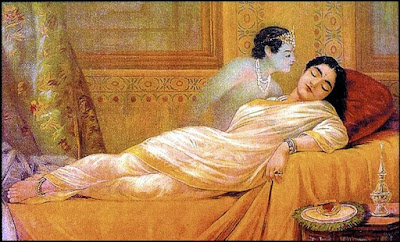Week 11 Reading B: Shri Krishna of Dwarka
CHAPTER 8. The Syamantaka Jewel: The Sun God in answer took from round his neck the great Syamantaka jewel and put it aside. Jambavat, King of the Bears, looking down from his mountain throne above the forest, saw the great jewel glittering between the lion's teeth. Akrura agreed and took back the Syamantaka jewel and wore it round his neck. Fearing that he should lose this chance of seeing Surya face to face, he said, "Great Sun God, you have blessed me far above other men by descending on earth to honour me. Now Krishna thought that it ill became a mere noble like Satrajit to possess so splendid a jewel. Then Krishna knew that he had the great jewel in his keeping for it furnished its owner daily with eight wagonloads of gold, and this and not the qualities inherited by him from his father was the real secret of Dwarka's prosperity, while he lived in it. At once Balarama sprang to his feet and claimed a half share in the jewel under his agreement with Krishna. Balarama did not believe his brother and thought that Krishna had found the great gem but was hiding it so as to cheat Balarama of his share. When Krishna heard of this false rumor, he called to him a picked band of Yadavas and, following the tracks of Prasena's horse, came to the spot where the lion had killed him. With all speed he ran into the forest and, killing the lion with one blow of his terrible paw, took the Syamantaka jewel back to the cave that behind his throne pierced deep into the mountains. "As you offer me a boon, great god," he said, "the boon I would ask of you is the Syamantaka jewel." "Take it," answered Surya and, leaving his worshipper gazing with greedy eyes at the matchless gem, the god returned in his chariot to the heavens. They had just finished the rites and were about to return sadly to their homes when the eastern sky was lit up with such a radiance that, although the sun was sinking in the West, the mourners thought that another sun was rising in the East.
CHAPTER 9. Adventures of Balarama and Pradyumna: Balarama, furious at the Kalinga king's taunt, raised the stake to ten million gold pieces and, by a lucky chance and in no way by his skill, won the throw. Then she taught Pradyumna all the wiles and magic of Sambara, and she showed him how to fight Sambara when he took in turn the forms of a wild beast, a serpent, a rakshasa, and a gandharva. At last the great river, feeling her strength failing and seeing her waters spread far and wide over the dry earth which sucked them up, took the form of a beautiful woman and, with folded arms, prayed to Balarama to forgive her. Thus, when Pradyumna was only six days old, Sambara took the form of one of Rukmani's waiting maids and, in this guise entering her palace, took Pradyumna out of his cot and carried him away to the seashore. The fisherman took the fish to Sambara's house for sale, and the demon, buying the fish, gave it to his wife Mayadevi to cook for his dinner. Then she told him that he was not her son, but that he must be the same boy whom the wicked Sambara had stolen from Rukmani and had thrown into the sea. " Balarama, stung by the insult, lifted the dice box high with both hands and brought it down edgeways and with all his force on Rukmi's head. One day Balarama went on a journey northward to see his old home Vrindavan and to meet again the cow-boys and the milking maids with whom he had played as a boy. Just after Pradyumna came back to Dwarka, Rukmi's daughter Rukmavati reached womanhood, and Rukmi held a swayamvara at which the princess should choose as her husband the one of all the princes assembled whose looks or speech or bearing took her fancy most.
CHAPTER 10. Naraka and Bana: The great God Shiva smiled at the prayer of the demon king and said, "Fool that you are, I grant you what you ask! "Great God," he prayed, "in my folly I implored you to send me a foe who would be a match for the strength of my thousand arms. "Great God," said the infatuated Bana, "my thousand arms have become merely a useless burden to me. Chitralekha who was deeply versed in magic said, "Your dream-lover is Aniruddha, the grandson of Krishna the world-famed prince of Dwarka. Krishna then reluctantly said to Aditi, "The reward that I ask for is the Parijata tree." Now Bana had a thousand arms, and when he brandished in each hand a weapon, no foe could stand against him. But Krishna, mounted on Garuda, was safe from the fire of the turrets and flew easily over the moat and the magic nets. Now a demon called Muru, who was skilled above all other demons in the art of fortification, had designed the defenses of Pragjyotisha city. One wiser than Bana would have heeded the great God's warning and would have fallen at his feet and implored him to take back his gift. Aditi was so pleased at their return that she bade Krishna ask for any reward he pleased. "I grant you the boon," said Shiva and departed. There they found not only Mandara's jewelled crest and the umbrella of Varuna the Sea God and the celestial earrings of Aditi, Indra's mother, but they found vast stores of treasure, stables full of elephants and matchless horses, and more than sixteen thousand princesses whom the wicked Naraka had taken captive from the cities of all India, nay even from the palaces of the gods themselves. Then taking a pencil and paper, she began to draw pictures of all the kings and princes of the day and also of the Gods, the Yakshas, the Gandharvas and the Vidyadharas.
CHAPTER 11. Nriga and Paundrika: The first brahmin said, "The cow is mine, and if I were to give her in exchange for a hundred thousand other cows, I should be selling her and would thus commit what in a brahmin is a great sin." When I learnt what I had done and that l had unjustly robbed a brahmin of his cow, I felt very sad, for I had been guilty of a great sin. With these words the Great God departed, and Sudakshin, heedless of the warning and thinking only of his vengeance, lit four great fires to the North, South, East and West. "Your boon is granted," replied the Great God; "light four fires, and from one of them a flaming shape will rise and do your bidding. "The cow that you gave me," he said, "is the only cow in the world that I want. The same night the cow broke loose from the brahmin's cow-shed and returned to mine. "King Yama," I answered, "let me first pay the penalty of my sins.""Be then born again as a beast," said Yama, and at once I became a chameleon. "Once upon a time," said the tall handsome man,my name was Nriga, and I was one of the Kings of the house of Ikshvaku. Yama said to me, "King Nriga, you won great merit in your life, but also you did great evil. Then, settling down over the great city, it set fire to it and consumed it, until at last all that remained of the town and its countless inhabitants, of its elephants and horses, of its granaries, courts and treasure houses was a vast heap of smouldering rubbish.
CHAPTER 12. Deaths of Jarasandha and Sisupal: The wise old Prince Bhishma tried to soothe Prince Shishupala, saying, "Prince Krishna has rid the earth of many fearful demons and monsters. The Prince went to Indraprastha and gave this counsel to his kinsman, "He who would hold a Rajasuya sacrifice, my kinsman," said Prince Krishna, "must be the greatest king in all India. King Jarasandha, taken thus unawares, could not but accept the challenge for his pride forbade him to free the captive kings or call to his guards for help. Yudhishthira stayed the sacrifices and performed, with all honour, the funeral rites of Prince Shishupala, the son of King Damaghosha, and named as Shishupala's successor his infant son. But Prince Shishupala would not heed the soothing words of the wise old Bhishma. " Then Krishna took his discus in his hand and called to the assembled kings, "O Heroes!" At these false and bitter words, Prince Bhima sprang from his seat and would have rushed on Shishupala and torn him to pieces where he stood. But so long as the cruel and wicked Jarasandha rules at Magadha, thou canst not say that thou art the greatest king in all India.
CHAPTER 13. The Passing of Krishna: It withstood the shock of the great waves of the western sea, and it still stands today to tell men of the great years when Krishna lived and of the mighty deeds that he accomplished. Daruka bowed low to Krishna's feet and, though loth to leave the prince, turned to do his bidding and went to Dwarka. Seeing Balarama's spirit thus depart, Krishna went and sat under a giant pipal tree. When the flood abated, all that remained of the fair city was the temple which the men of Dwarka had raised to Krishna to the east of the city. Some years after Krishna's return from Indraprastha, Prince Samba, the son of Jambavati the Bear-King's daughter, went with some other young Yadava nobles to Pindaraka. As he sat in deep and sorrowful thought, Jara, the very hunter who had turned the handle of Samba's club into an arrow head, stole softly up looking for game. The Yadavas and the other burghers agreed, and the men harnessing their chariots drove with all speed to Prabhasa. Then a great fire rose out of the sea and swept inland over the bodies of the dead Yadavas, consuming them to ashes. As he did so, the prince's four matchless horses bounded forward and, rising in the air, took the chariot with them higher and higher until they were lost in the clouds.
Bibliography: Shri Krishna of Dwarka and Other Stories, C. A. Kincaid, Story



Comments
Post a Comment